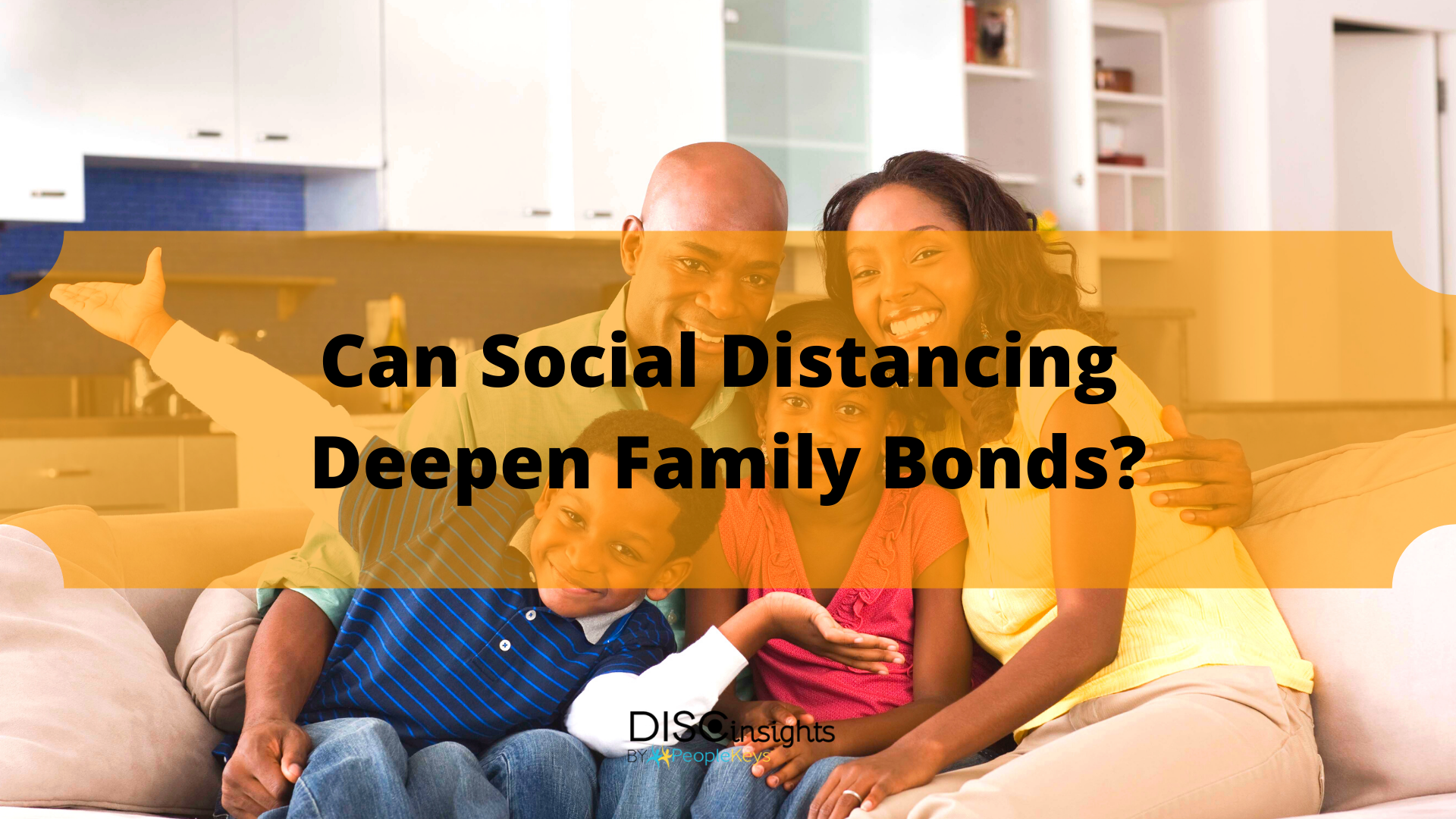- SHOP BY PRODUCT
- DISC TRAINING & CERTIFICATION TOOLS
- DISC RESOURCES
- BLOG
- SHOP BY PRODUCT
- DISC TRAINING & CERTIFICATION TOOLS
- DISC RESOURCES
- BLOG
- ALL ITEMS



With even no effort, it already has. The real question is, “How are you taking advantage of time together?” We offer these relationship-bonding tips.
While the past few weeks could be described as a disruptive blur of changes peppered with anxiety, chaos and questions. One thing certain is we are all dealing with a new normal for the near future. Couples and families once stretched thin to grab quality bonding time now find themselves forced to spend every day together, seemingly trapped inside their house. After the panic subsides and working roles shift, will you take advantage of the opportunity this pause has provided you to connect with those closest to you?
The novel strain of Coronavirus COVID-19 has recklessly crept into our communities shuttering businesses, restaurants and places of worship. Oddly, new gatherings are cropping up everywhere, the ones within the home. The family unit has accidentally become a thing again. As unprecedented home boundedness has kept us in pajamas longer, it’s prompted us to explore our basements and backyards like never before. Dealing with boredom and stir craziness is now in the back of many minds. At home, you can leverage work video conferencing, OD on binge worthy streaming, Google puppy pictures, or rearrange your sock drawer, but that won’t necessarily make your relationship bonds tighter, more close-knit, more intimate, or garner more understanding of one another.
Fortunately, this opportunity won’t last forever, so why not take advantage now by spending quality time to get to know your housemates. Whether you’ve been together for a hot minute or you’ve managed 50+ years of cohabitation, there’s always room to grow. A friend of mine recently said of her husband and teenagers, “It’s kind of sad to know they will eventually head back to work and activities again.” I know not everyone shares that idealistic view of their relatives or roommates. If your clan is more “Arrested Development" than “The Andy Griffith Show,” or regardless of where they fall on the spectrum of family/group dysfunction, you can tighten your relationship bonds in small ways daily.
Raid the pantry, dig out recipes, or try canning grandma’s relish recipe. Use that Crockpot. Unbox the Instant Pot you got for Christmas. Have a bake-off. Sweets, like chocolate, release endorphins that do more than satisfy cravings. They release chemicals to make us feel good. Another side effect of cooking together that brings us closer is the conversation that naturally happens.
This one is a no-brainer. Everyone has to eat and most homes have tables. Combining conversation around nourishment is the best, most comforting way to pass time together. Yet in so many homes, dinnertime is sacrificed to busy schedules, sports, social clubs, volunteerism, and simply trying to squeeze every last bit out of each moment. As a result, we conveniently take our families for granted. Around the dinner table we can share news and views, voice concerns about world events, commiserate in support with loved ones, and pray. This is gratifying, reassuring, and sustaining at a very base, vicarial level.
At our house, we’re dusting off the board games we grew up playing. Monopoly, Risk, and Scrabble have all made it out of the closet. Balderdash is a favorite and typically gets us making up and sharing outlandish scenarios. It’s as luxurious an endeavor as breaking out that 1000 piece puzzle. Who has the time anymore? Well, now we all do it seems.
Make crafts, create a play, dance, plant a garden, put together a Comicon costume, or even build a Lego sculpture of your dog. Just so it’s hand’s-on and doesn't require eyes transfixed on glowing screens. Let’s face it, most of our days are spent interacting with screened devices. This is how we work, learn, get media, socialize and game. Bake some hustle into your creative time together by making it hands on, sweat-worthy, and screen free.
Lastly, use the DISC personality system to learn about the behavioral style of yourself and the people who live with you. What are your behavioral characteristics? How do each of your strengths and limits differ? What are the dynamics of your styles under stress and pressure?
Taking the DISC survey as a group is an activity where you can all participate, share and discuss. Best of all, you can use the info learned to avoid getting on each other’s nerves while stuck inside, as close quarters can sometimes bring out the worst in one another. At home, my family calls this avoiding the “big red button.” The button is different for each of us, yet the outcome is the same. It triggers a bad mood. Bad moods in a home can also go viral, especially when you are already dealing with stressful, uncertain times like these.
Your family, household, or roommates can take a DISC assessment here to discover your DISC personality styles (hint: it takes under 10 minutes to get over 20 pages of info about your personality).
Think of the DISC personality system as a group effort in learning a new language. DISC is the universal language of behavior, widely regarded as a simple way to understand one another. I say this because our entire extended family and all of my work colleagues use the DISC language to understand each other, to understand new people and take the pulse of groups of people. This language is useful in quickly getting in-sync with new people and avoiding big red button behaviors because our triggers are even more sensitive under increased pressure.
If there is any silver lining in the current state of lockdown, it’s that we’re all going through this together, literally together in small group isolation. So, as schedules empty, we are noticing pantries and dinner tables filling up. This sudden, unpredicted, and for some, awkward phenomena can and will transform relationships if we use this pause as an opportunity to build better relationships, family bonds and communities.

© PeopleKeys. All Rights Reserved
WORKING DAYS/HOURS
Mon - Fri / 8:30AM - 5:00PM EST
